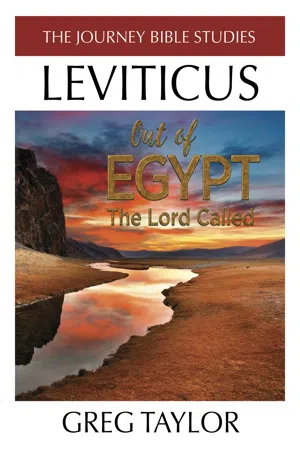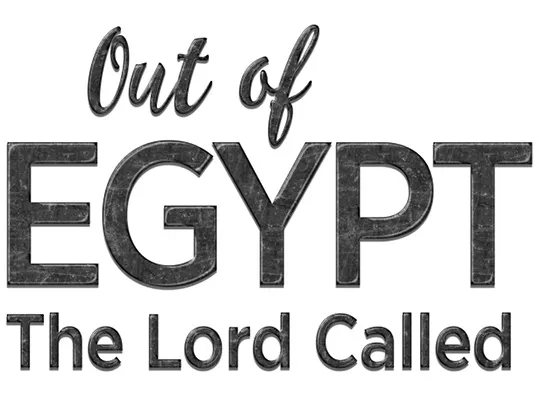Out of Egypt: The Lord Called
A Study of Leviticus
Copyright 2016 by Greg Taylor and The Journey: A New Generation Church of Christ
www.thejourneychurch.faith
ALL RIGHTS RESERVED No part of this publication may be reproduced, stored in a retrieval system, or transmitted in any form by any means—electronic, mechanical, photocopying, recording or otherwise—without prior written consent.
Scripture quotations, unless otherwise noted, are from The Holy Bible, New International Version. Copyright 1984, International Bible Society. Used by permission of Zondervan Publishers.
Cover design by Nyasha Peters and Greg Taylor Interior text design by Sandy Armstrong, Strong Design
Table of Contents
Chapter 1 The Lord Calls Us Back in Time 7
Chapter 2 How Do We Live With Holy God? 19
Chapter 3 What Do We Do About Sin? 31
Chapter 4 What Happens When God Sends Holy Fire? 41
Chapter 5 What Would You Do If God Struck Your Two Sons Dead? 53
Chapter 6 Are You Holy Enough? 63
Chapter 7 Where Do We First Learn About Atonement? 79
Chapter 8 Where Did Jesus Get That Bit About Loving Neighbors? 89
Chapter 9 What are Ways to Live a Life of Jubilee? 113
Chapter 10 Yahweh Loves Forever 121
Conclusion Lord, What Do You Want Me to Do? 133
Resources Where Can I Find More on Leviticus? 137
CHAPTER 1
The Lord Calls Us Back in Time
Going Back in Time
My wife and I once took our three children to Williamsburg, Virginia to see the old town. As we crossed a bridge from the visitor’s center to Williamsburg, we passed signs telling us we were going back in time. It was the closest thing I’ve ever experienced to a time machine.
The sign read something like this: It is now 1940, and you have no computer or cell phone. We passed another sign. 1900: women cannot vote. You’ve never seen an automobile. Finally, before entering the old town was a sign reading, 1779: You are entering Williamsburg.
When we arrived, we talked with blacksmiths, cobblers, book binders, bakers, brick makers, and silversmiths who all stayed in character throughout our visit.
In order to reach the world of Leviticus, we would continue on an imaginary path further back in time. 1350: Europe is crushed by the black death. 300: Rome collapses. 30: Jesus walks the earth.
Now the steps take you into time before Jesus Christ. 500 BC: rebuilding the Jewish Temple. 1000 BC: Saul anointed Israel’s first king. 1400 BC: God frees Israel from slavery and calls them into the wilderness, the setting of Leviticus.
One of the problems with understanding ancient Bible texts is that we are so far removed from them. So we have stepped back in time in order to put ourselves more into the story.
We’ve walked back in time to the approximate date of the establishment of Israel and the events described in Leviticus. You no longer know what a cell phone is. Your computer is your brain and digits are on your hands. Animals are your property and valuable to you, as is salt, oil, and grains from the fields. Your people have left Egypt and are on a journey to the Promised Land.
We’re so happy to be free, but we wonder what’s next? Moses is hearing the word of the Lord and repeating those words to us. The book of Leviticus tells the story about what God has to say to His people about what’s next after they come Out of Egypt.
What language does God speak?
When I was nineteen, I studied and traveled internationally. My fellow students and I were based outside of Florence, Italy, in a villa in Tuscany. Italians taught us to say what Tuscany and its people were: “Bella.” Beautiful. Two sweet Italians named Miranda and Renata fed us tortellini and lasagna.
They cooked lunch and dinner, but breakfast was on our own. I was paid work study to be “breakfast boy” of our college group and faculty. We ate hard bread, jam, and drank lattes. Each morning, I made a big pot of cafe latte for a crowd, and this was in the 1980s, before lattes were cool.
As we traveled, our faculty taught us much about what we were seeing. We visited ancient Roman ruins, the Eiffel Tower, paintings in museums and cathedrals. Knowing what we knew, we still often shrugged and walked on. One of our fellow students named Wayne said he had a photographic memory, so he carried no camera, just drank it all in. Indeed, he may have remembered more by viewing the world not through a camera lens but through the naked eye.
We traveled to Paris, Munich, Strasburg, Amsterdam, Rome, but mostly what we did was eat. Italian gelato—Stracciatella and Fragola to be exact. Did our faculty sponsors want to shoot us in the neck with tranquilizer darts and replace us with students who cared more about art and less about gelato? Likely.
In the midst of this toggling between “learning” and gelato, I truly learned something very important that changed my life. I won’t forget the smallish old domed church house where this became clear. Our student group attended a worship service in Italian. No translation. If we wanted to “get something out of it,” we were going to have to strain to hear the bits of Italian we had been learning.
That was the day and the place I realized this: God doesn’t speak English. Well, I have no doubt He can speak English, but I never imagined that God spoke anything but English. Worse further, till then I imagined God needed to be spoken to in King James English. “Thou” and “Thy” were considered the only proper and holy ways to refer to God. But these, I learned in Italy, were only old English ways of referring to God. God had spoken and was spoken to in many languages for many centuries, and English was a relatively new language for communicating with God!
What is Leviticus Anyway?
So, what language did God speak in the world of Leviticus? Hebrew.
Hebrew is read from right to left. Even the titles in the Hebrew Bible are different from our English translations. Leviticus is not titled Leviticus or even a Hebrew equivalent. Hebrew titles are typically the same as the first word of text. In this case the first line of text in Leviticus is wayyiqrā’, which means “He [the Lord] called.”
Over the centuries of translations, eventually the title changed. English followed the lead of Latin and Greek translations that attempted to give titles that described the contents. Therefore, the English title Leviticus is a transliteration of Latin and Greek titles, and it means, “Instructions to the Levites.”
Do not, however, let the name Leviticus mislead you, because the original title in Hebrew is the beginning of the first line of text that goes on to say that “the Lord called Moses.” That is why this book is titled, “Out of Egypt: The Lord Called.”
Leviticus is the story about how Moses was called by God, and then Moses was told to call Israel to worship and serve the One Holy God who led them out of Egypt and into a life of freedom and holiness.
Is Leviticus Only for Jews and Levites?
Is this book only for Israel? Even more narrowly, is Leviticus written for people like Aaron, Moses’ brother who was the first priest? Wasn’t it just laws about how to worship God that are now done away with after Jesus died on the cross?
Does Leviticus and the words God spoke through Moses to Aaron, the Levites, and Israel still matter today?
First, not all Levites were priests. They were all from the Levite tribe but not all in the tribe were priests. Second, while Leviticus 1-16 is addressed to the Levite priests and their ritual practices in the tabernacle, the second half is addressed to all of Israel. Furthermore, I believe Leviticus is not just a c...



